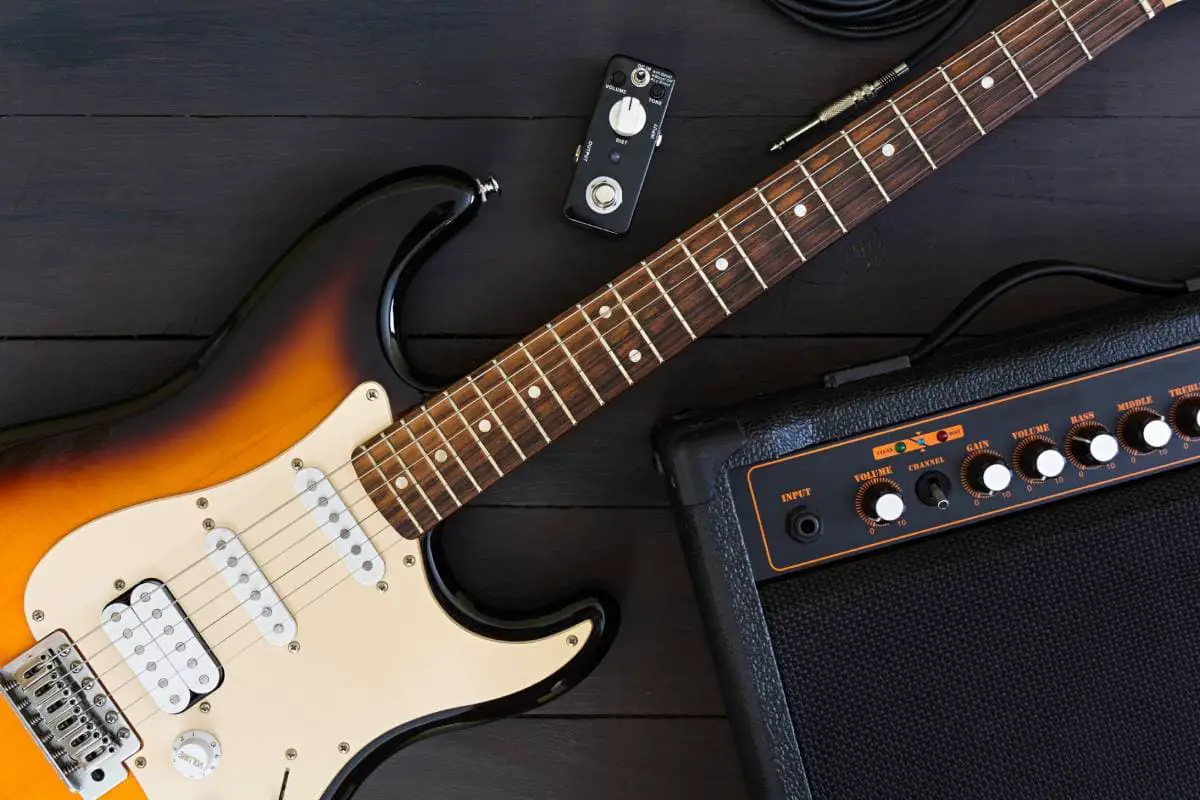Nobody enjoys a buzzing guitar amp, whether practicing at home or playing for an audience. A little buzz when your amp is idle is normal and nothing to worry about, but if the buzz is loud and continues while you are playing, it can be distracting and even ruin your gig. There are many reasons why guitar amps buzz; some are much easier to fix than others.
When guitar amps buzz, it might be caused by a damaged cable, poor electrical grounding, dirty audio jacks, or ground loop problems. Some solutions include replacing a cable, soldering the ground wire, cleaning the jacks, and investing in a power stabilizer.
In this article, I will explain the issues that can lead to amp buzz and give you some easy fixes to make your amp sound better than ever. Let’s go!
If you want to find out what my recommended guitar gear is, then here is what I recommend on Amazon:
- Fender Cutaway Acoustic-Electric Guitar Bundle (MY FAVORITE GUITAR)
- Snark SN-8 Super Tight All Instrument Tuner (Easiest Tuner I’ve Used)
- 6 String Acoustic Guitar Capo (Best CAPO for quick changes)
- Dunlop Max Grip 1.0mm Nylon Picks (Thick Guitar Pick So You Don’t Lose Grip!)
- Universal Guitar Stand (Cheap & Minimalist Guitar Stand I Recommend)
- Levy’s 2″ Wide Quick Adjust Guitar Strap (Best Guitar Strap For Any Level)
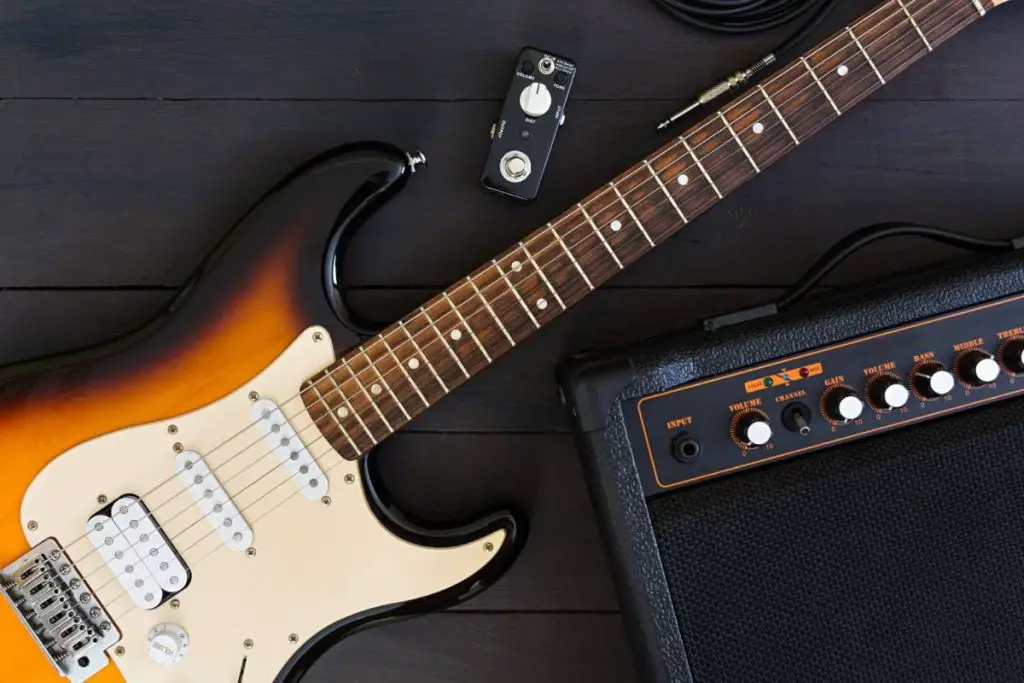
1. A Damaged Cable Is Causing Your Amp To Buzz
A buzzing amp can be highly irritating when trying to rock out, but unfortunately, it happens. Many factors could cause an amp to buzz, but a damaged cable is one of the most common and straightforward issues to fix.
If your cable is old and bent in some places, it can cause static. Also, your cable is a problem if you hear a crackling sound. A damaged cable can cause all sorts of issues with the sound of your amp. It would be best if you had a solid connection between your guitar and amp for optimal sound quality.
How To Fix It
If you believe your cable is behind your amp’s annoying buzz, follow these easy steps:
- Check that you have plugged all your power cables securely.
- Unplug your guitar from your amp and remove the connecting cable.
- If the buzz continues, the problem is with your amp, not your cable.
- If the buzzing stops, check your cable for any visible issues.
If you have established that your cable is the issue, the easiest solution is to purchase a new cable. When buying a new cable, make sure it is a thick, good-quality cable like this Fender Professional Series Instrument Cable (available on Amazon.com).
It has an 8mm outer diameter wire jacket that will protect your wires from damage and Nickel-plated connectors, which will help minimize buzz. A good quality cable like this one will last a long time and ensure your amp has the best sound output.
If you enjoy a challenge and own a soldering iron, you can open the cable and check for any loose wires. If there are loose wires, you can use your DIY skills to solder the wires into place before securely taping the cable closed again.
It is a good idea to have a regular maintenance schedule where you check your guitar, amp, and all your accessories, including the cables.
2. Grounding Issues Are Causing Your Amp To Buzz
A Buzzing amp does not mean that it is faulty or that anything is wrong with the amp itself. Many factors that cause an amp to buzz have more to do with your guitar than the amp itself.
A guitar that is not grounded correctly can cause an amp to buzz. This problem is not an issue that is easy to see but happens often. To test this, plug your guitar in but don’t play it or even touch the strings. If there is buzzing, you might have a grounding issue.
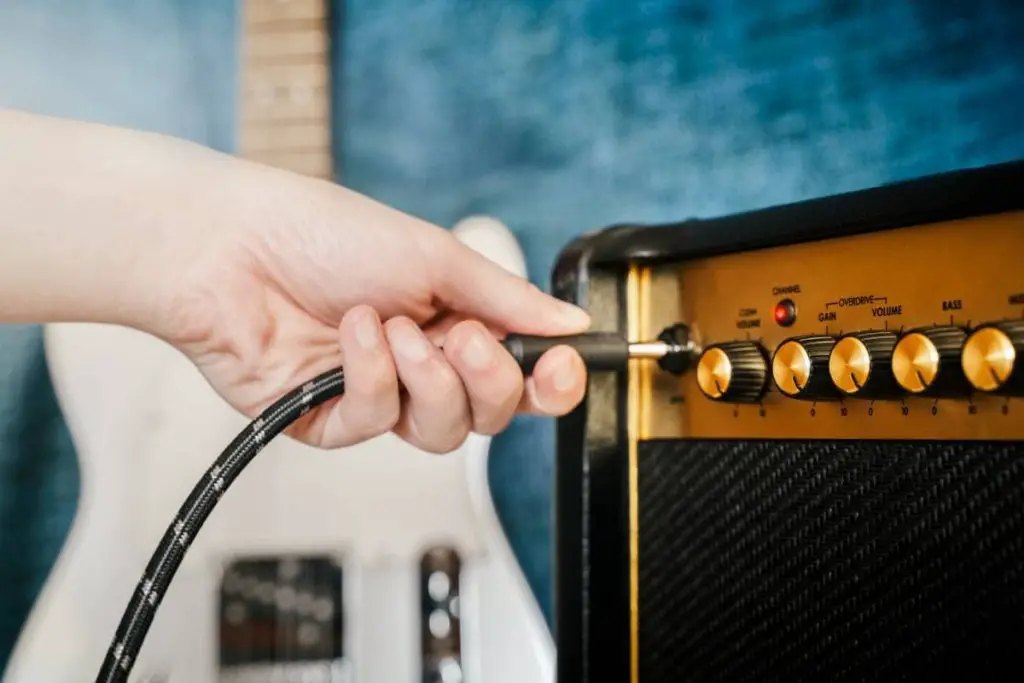
How To Fix It
Repairing a grounding issue is more complicated than buying a new cable but not a difficult fix. Your grounding wire will most likely be in the same cavity as your guitar’s electrical wires. You can open up the cavity and have a look; if the ground wire is loose, soldering it into place will stop the buzz.
If you open the cavity but can’t find the grounding wire, it might connect to the tailpiece stud. When the grounding wire connects to the tailpiece stud, it is more challenging to get to, but you can still accomplish your task.
Investing in a guitar repair kit may be necessary, but you might be able to do the job with some of the tools you have lying around the house.
3. The Pickup Is Causing the Buzz in Your Amp
Many guitars have single-coil pickups, which can cause your amp to buzz. The guitar pickup can pick up interference from many different sources, and if you turn up the distortion, the buzz will most likely double in volume too.
If you have a humbucker pickup and your amp is buzzing, you can rule out the pickup as the problem. Humbuckers do not pick up interference so that they won’t cause any amp buzz.
Most entry-level electric guitars come with single-coil pickups, so the pickup might be the problem unless you have a humbucker installed.
How to Fix It
Buzz caused by your pickup isn’t something you can fix, so the best solution is to move away from any interference. You can also look into replacing your single-coil pickup with a more expensive one. You get some excellent quality single-coil pickups that will cause much less buzz than a cheaper standard one.
You can get these Fender Tex-Mex Pickup Set (available on Amazon.com) which are perfect for rock music and shredding when used with an overdrive pedal. They provide a balanced output and will cancel out much of the buzz. These pickups look good, and your guitar will sound better than ever.
If you don’t want a single-coil pickup, you can get this Seymour Duncan Humbucker Pickup (available on Amazon.com). It will fit into your single-coil slot so you can easily install it, eliminate all the buzz, and get a clean sound. This product is the perfect pickup for playing heavy metal solos.
4. Your Amp Has a Ground Loop Problem
The electrical installation may be causing your problem. Plugging your amp into the same electrical power source as an appliance that pulls a lot of energy can cause buzzing.
If this is the issue, you will hear a lot of constant buzzing that doesn’t go away unless you disconnect all other electrical appliances or equipment from the power source.
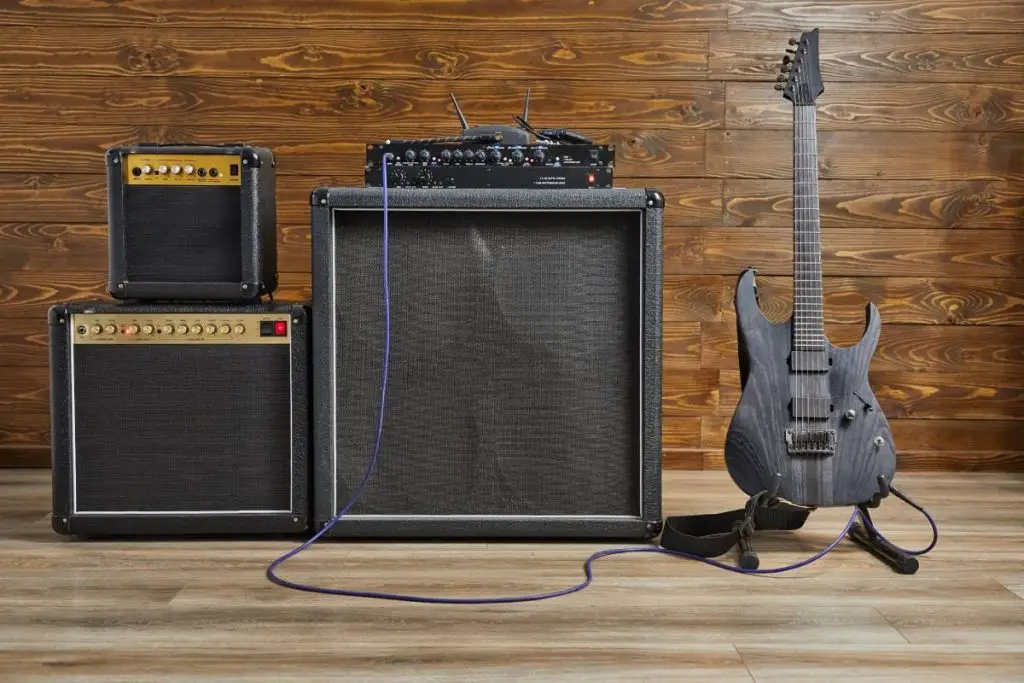
How To Fix It
If the electrical current is not strong enough, your amp will buzz. There are a few options you can try to rectify the buzz from ground loop problems, including:
- Ensure your amp does not share a power source with the lighting while performing on stage.
- Use a thick power cord that is in good condition. You can check your power cable by moving it around while connected to the power source. If the buzzing stops and starts again, it can be the cable.
- You can invest in a good quality power conditioner.
- If you are using a tube amp, look at your vacuum tubes to ensure they are fine and replace them if necessary.
- Purchase a power supply for your pedals.
- Get a hum eliminator to cancel out the noise.
- Buy a power stabilizer so that other appliances don’t interfere with the sound of your amp.
5. Your Amp Has Badly Shielded Electronic Components
When it comes to electrical components, you must ensure that you adequately shield your electronics. The same goes for your electric guitar. If you hear a lot of buzz from your amp, you can try this exercise:
- Take your hands off the guitar, and listen to your amp without touching any part of it. Take note of how loud the buzzing sound is.
- Now touch the strings of your guitar and any metal parts and listen to your amp while doing it.
- If the buzzing sound increases, you may have shielding issues with your electrical components.
How To Fix It
It would be best to ensure that you have shielded your electronic parts. To do this, you should follow these simple steps:
- Buy some copper foil and cover all the cavities where there are wires and electrical components.
- Ensure you cover every inch of the cavity to avoid buzzing
- Check your wiring while you are doing this.
- If any wires look old or damaged, replace them.
6. Incorrect Settings or Volume of Your Amp
The settings of your amp are essential. If you set the volume too high or your setup is wrong, it can cause your amp to buzz.
Different genres of music require different setups. Rock and metal music needs the distortion and overdrive to be higher, leading to louder buzz. The higher you set the gain on your amp, the more buzz it will experience.
It is not a point of concern if your amp buzzes when you are not playing but stops when you start. Most amps will experience some buzz when they are idle. A little buzz while playing is also not too bad, as long as the sound of the music you are playing drowns it out.
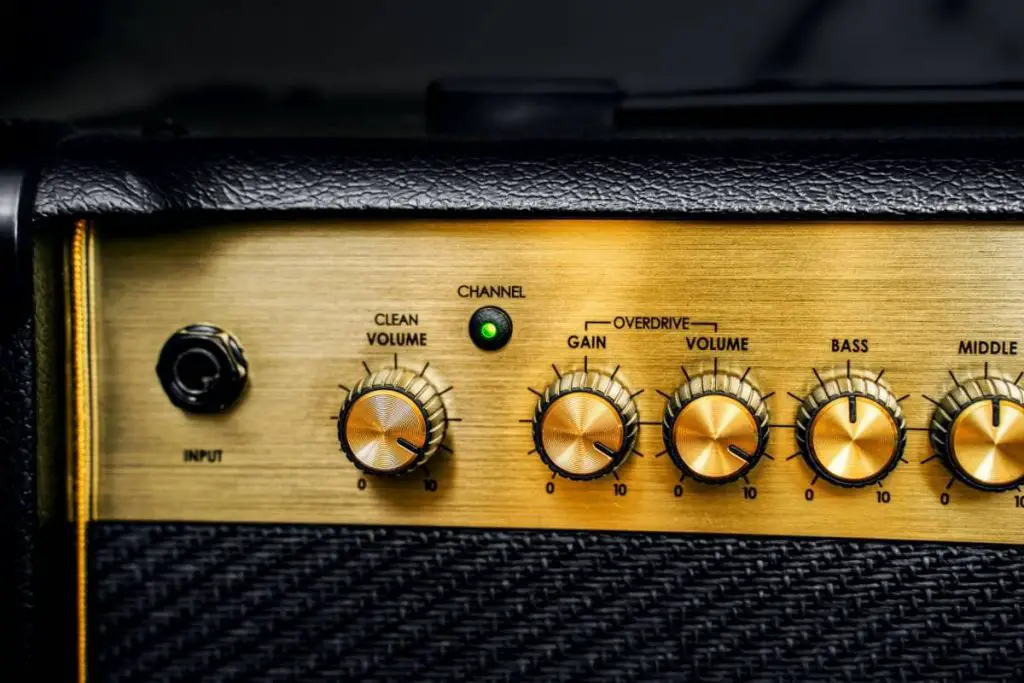
The higher the wattage of your amp, the louder the buzz will be.
How To Fix It
This issue is an easy fix; you have to find the correct settings for your amp and the type of music you play. As soon as you have adjusted the settings, you should hear less buzz from the amp.
If unsure what the settings should be, you can speak to other guitar players, look to YouTube or go to a music store and speak to a sound technician.
7. Your Guitar Amp Has Dirty Audio Jacks
Checking your audio jacks for dust and dirt is not something we do regularly, but dirty audio jacks can cause a lot of static and buzz. As with most things, you should maintain your cables and electrical components for optimal performance.
How To Fix It
Cleaning input jacks is easy by following these simple steps:
- Gather some cotton swabs and a decent electrical contact cleaner.
- Make sure to clean both the input jacks on your guitar and your amp.
- When cleaning the input jacks, amp jacks, or any electrical components on your guitar or amp, you should always allow adequate time to dry before using them. A standard waiting period of one hour should do.
- Never plug in your electrical cables before they are dry as this could cause a short or even damage your equipment.
8. Your Amp Is Picking Up Interference
Your amp can pick up interference from various electrical devices and appliances. Interference can cause your amp to buzz and make unwanted noise.
Cell phones and fluorescent lighting are the most common items that cause interference in your amp. I know this might sound strange, but lighting can cause a lot of interference, and since your pickup works like an antenna, it picks it up and causes the amp to buzz.
It is the same as when you are singing karaoke, and the speakers keep making that awful squeaking noise. It would be best if you found the right spot, far enough away from interference.
How To Fix It
If it is your cell phone causing the interference, you have to move it far enough away so that your pickup doesn’t pick up the interference.
On the other hand, if it is the lighting that is causing the interference, you might have a bigger issue. If possible, you can find another place to practice, but ensure no interference from the lighting in the new site.
If you don’t have any other place to practice or are performing at a venue, you can try moving your amp around to a spot where there is less interference.
You can also invest in a power conditioner like this Furman M-8×2 Power Conditioner (available on Amazon.com). It has AC noise filtering, which reduces RFI and EMI interference. You will have a much cleaner sound without buzz, pops, and crackles. It also has pike and surge protection, meaning your equipment will be safe and your power clean.
9. Dirty Pots in the Amp Are Causing the Buzz
If you are a novice, you might not be aware that the pots in your amp can get dirty. Dust accumulates in them and might be the cause of the buzz. To test this, plug your amp in and turn the knobs. If the buzz increases in volume, then your pots might be dirty.
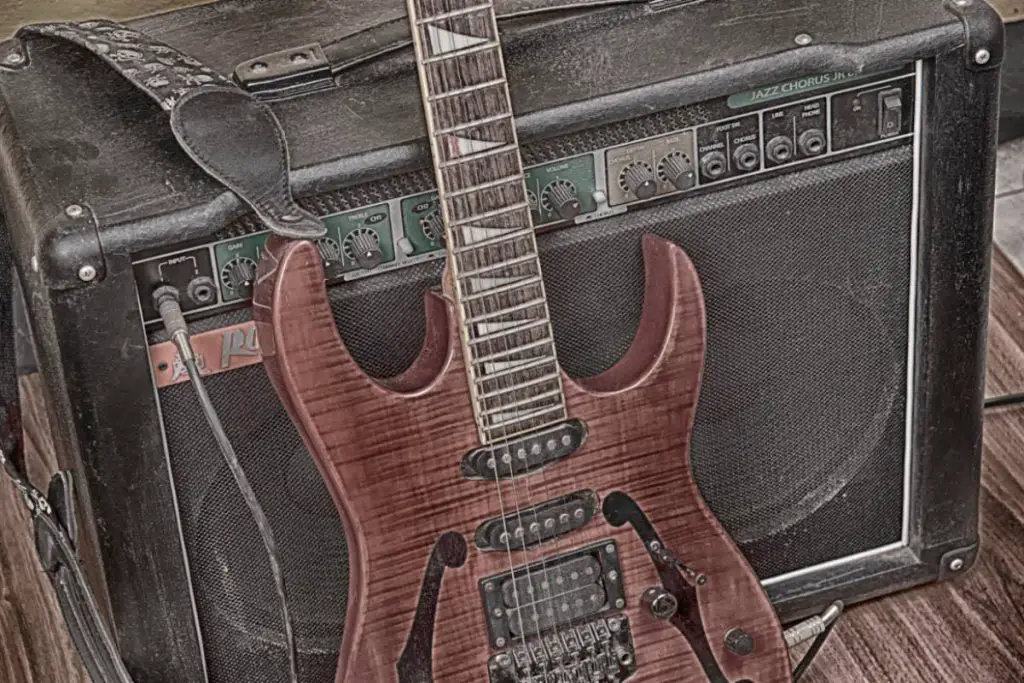
How To Fix It
You can fix this issue yourself by following these simple steps:
- Ensure that you unplug your amp before working on it.
- Open up your amp to clean the pots.
- Clean the pots in your amp with an electrical contact cleaner.
- After cleaning the pots, you can put your amp back together, but you should wait a while before plugging it in as it will need to dry.
Here is an informative YouTube video showing how to clean amp pots. It is not a difficult job, but you should always be careful when working with electrical components.
10. Your Pedals Are Causing the Amp To Buzz
Not all guitarists use pedals, but if you do, it could cause your amp to buzz. Pedals can break, and you should maintain your pedals like your guitar and amp. If your pedal is old or you use it a lot, some of the wires inside might have come loose. Incorrect settings can also cause a buzz.
How To Fix It
The first thing you should do if you think your pedal might be causing your amp to buzz is to check your settings. You might have set the gain incorrectly, or the volume can be too high.
If your settings are correct, you can open the pedal to see if some of the wires have come loose. You can connect a wire by soldering it back into place or invest in a new pedal like this FLAMMA Portable Pedal FX100 (available on Amazon.com).
It has 151 built-in effects, and 200 presets to help you set up your sound perfectly. This pedal is perfect for heavy metal or rock guitar players as it has nine effect blocks, including distortion and overdrive. It has an 80-second looper and can connect to your computer or mobile phone.
You Amp Has Faulty Components
If the above tips do not solve your issue and your amp continues to buzz, it might have a faulty component. If you have a warranty on it, take it to the shop you bought it from so that they can fix or replace it.
For older amps that are not under warranty, you can try opening them up to see if you can figure out which part might be damaged. If you can figure it out, you can order the part and replace it yourself. It is always best to take your amp to your local music shop or electrical repair for repairs if you are not sure what is causing the problem.
Conclusion
Many factors can cause your guitar amp to buzz, but most are easy to fix.
The most common issues are a faulty cable, ground loop issues, dirty audio jacks, and interference. It might also be that your amp isn’t receiving enough power from the power source where you plugged it in.
Do the necessary checks to isolate the cause of the buzz, follow our easy tips to fix the problem, and before you know it, your amp will be buzz free.
If you want to find out what my recommended guitar gear is, then here is what I recommend on Amazon:
- Fender Cutaway Acoustic-Electric Guitar Bundle (MY FAVORITE GUITAR)
- Snark SN-8 Super Tight All Instrument Tuner (Easiest Tuner I’ve Used)
- 6 String Acoustic Guitar Capo (Best CAPO for quick changes)
- Dunlop Max Grip 1.0mm Nylon Picks (Thick Guitar Pick So You Don’t Lose Grip!)
- Universal Guitar Stand (Cheap & Minimalist Guitar Stand I Recommend)
- Levy’s 2″ Wide Quick Adjust Guitar Strap (Best Guitar Strap For Any Level)
Related Posts:
- Guitar Amp Not Working but a Light Is On? How To Fix It
- Acoustic Electric Guitar Not Working With Amp? 4 Fixes
- How To Tune Your Electric Guitar Without an Amp
- How To Test an Electric Guitar Without an Amp
- Electric Guitar vs. Acoustic Amp: Differences Explained
- Will an Electric Guitar Damage a Bass Amp?
- Will an Acoustic Amp Work With an Electric Guitar?
- How To Create A Dummy Load For A Guitar Amp
- Best Guitar Amps: tube, solid-state and modeling amplifiers for all budgets (Acoustic, Electric)

